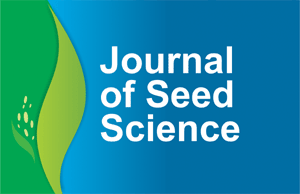ABSTRACT:
Prior to commercialization, seeds of peach palm (Bactris gasipaes Kunth) have to undergo the germination test, whose well-established methodology takes 120 days. Due to their recalcitrant behavior, the seeds have short longevity when stored (around 30-45 days), which makes it challenging to select the most viable ones for marketing. This study aimed to determine a methodology for the tetrazolium test to be carried out in peach palm seeds, in order to fast deliver results that can be correlated to the germination test. Different forms of pre-conditioning, preparation, and staining were investigated via moisture content, germination, and tetrazolium tests, so as to define the vital parts of the seed and sort out the viability classes. For the seed lot under study, the tetrazolium test delivered results supported by the germination test when the following procedures were adopted: pre-conditioning by water submersion (20 °C for 24 h), longitudinal cut adjacent to the embryo, and half-seed immersion (embryo + endosperm) in a 1.0% tetrazolium solution for 4 h at 30 °C. Having fulfilled these criteria, it became possible to separate the peach palm seeds into two classes (viable or non-viable).
Index terms:
Arecaceae; Bactris gasipaes; germination; physiological quality; biochemical test

 Thumbnail
Thumbnail
 Thumbnail
Thumbnail
 Thumbnail
Thumbnail
 Thumbnail
Thumbnail
 Thumbnail
Thumbnail




